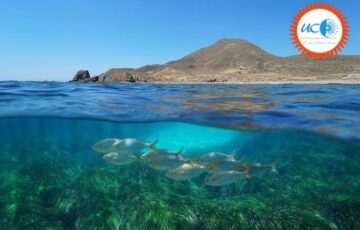Q. Enumerate the major causes behind marine heatwaves. Also, discuss their impact on the ocean ecosystem.
Approach:
- Give a brief definition of marine heatwaves (MHWs).
- Mention various causes responsible for MHWs.
- Write about the impact of MHWs on the ocean ecosystem.
- Conclude accordingly.
Answer:
Heatwaves that occur in the ocean are known as marine heat waves (MHWs). MHWs are said to have occurred when seawater temperatures exceed a seasonally varying threshold (i.e. remain in the top 10% of local average values) for at least 5 consecutive days.
Causes behind MHWs
- Ocean Warming: Climate change induced Global Warming has led to unprecedented rise in sea surface temperatures which has increased at a rate of nearly 0.6°C per century since 1880 (IPCC AR5). This warming in turn increases the likelihood of marine heatwaves, extending their length and pushing them to higher temperatures.
- Atmospheric blocking: Atmospheric blocking leads to sparse cloud cover and relatively calm winds. The lack of clouds allows more solar radiation to reach the ocean and warm it; at the same time, the still air inhibits mixing and evaporation. All these factors can lead to a build-up of heat in the upper ocean. And that can shift the wind patterns in ways that intensify or prolong the warming. About 60% of MHWs events in the southwestern part of the Atlantic Ocean were caused due atmospheric blocking.
- Ocean currents: These can build up areas of warm water and air-sea influx. The deepest and long lasting MHWs are typically driven by ocean currents (for example, in the Tasman Sea), in contrast to shallower summer MHWs, which are driven by the atmosphere.
- Winds: Winds can enhance or suppress the warming in a MHW, and climate events like El Niño can change the likelihood of events occurring in certain regions.
Impacts of Marine Heat Waves on Ocean Ecosystem
- Biodiversity & habitat loss: MHWs have been associated with the mass mortality of marine invertebrates, and may force species to change behaviour in a way that puts biodiversity at increased risk of harm. Changing conditions can also help invasive alien species to spread, which can be devastating for marine food webs.
- Economic loss: MHWs can affect the spawning and recruitment of fish and other sea animals, and in turn have significant impacts on aquaculture and fisheries. MHWs can also harm regional tourism.
- Extreme weather: Higher water temperatures associated with MHWs can cause extreme weather events such as tropical storms and hurricanes, and disrupt the water cycle; making floods, droughts and wildfires on land more likely.
- Increased ocean stressor: MHWs often occur alongside other stressors such as ocean acidification, deoxygenation, and overfishing. In such cases, MHWs not only further damage habitats, but also increase the risk of deoxygenation and acidification.
Thus, given the severe and long-lasting impacts of MHWs on marine life and human society, it is necessary to implement measures to slow ocean warming and counteract the impacts of MHWs by building ocean resilience. Governments must invest in nature-based solutions alongside ambitiously reducing fossil fuel-based emissions and also need to involve other stakeholders for designing and implementation of solutions.




